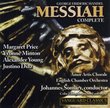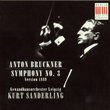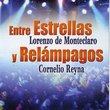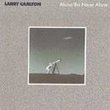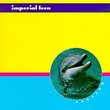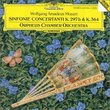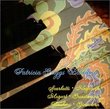| All Artists: Jean Sibelius, Alexander Gibson, Wilfred Wilson Gibson, Scottish National Orchestra, Phyllis Bryn-Julson Title: Sibelius: The Complete Tone Poems Members Wishing: 0 Total Copies: 0 Label: Chandos Release Date: 10/28/1992 Genre: Classical Styles: Forms & Genres, Theatrical, Incidental & Program Music, Symphonies Number of Discs: 2 SwapaCD Credits: 2 UPC: 095115839522 |
Search - Jean Sibelius, Alexander Gibson, Wilfred Wilson Gibson :: Sibelius: The Complete Tone Poems
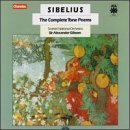 | Jean Sibelius, Alexander Gibson, Wilfred Wilson Gibson Sibelius: The Complete Tone Poems Genre: Classical
|
Larger Image |
CD DetailsSimilar CDs
|
CD ReviewsA must have for any Sibelius fan SJR | Wichita, Kansas | 06/18/2000 (5 out of 5 stars) "It is rare to find this many of Sibelius' tone poems in one collection. And Gibson and the SNO give very good performances of these tone poems. I was particularly impressed with Spring Song, a Sibelius gem with which I had not been familiar...very moving and uplifting. All-in-all, a good addition to your Sibelius library." An absolutely fabulous collection! chefdevergue | Spokane, WA United States | 04/16/2004 (5 out of 5 stars) "I don't like to throw the superlatives like "definitive" around too much, but I am very much tempted to do so in this case. First of all, it is not often that one finds all of Sibelius' tone poems in a single collection of any quality whatsoever. Secondly, even recordings of single tone poems rarely match the quality of these performances.Like the previous reviewer, I was not well-acquainted with "Spring Song," and was glad to become familiar with this relatively obscure gem. As far as the usual warhouses, Gibson & the SNO remind us just how thoroughly Sibelius made the genre of the tone poem his own and raised it to levels not dreamed of by composers such as Liszt. Listen to the first 3 1/2 minutes of "Pohjola's Daughter" and tell me that it isn't the most perfectly composed music, of any period or genre, that you have ever heard.It amazes me that my review is only the second of this collection, considering that it has been available for a considerable amount of time. Get this collection! It is simply fabulous music from beginning to end, and shows Sibelius at his best." An Excellent Sibelius Tone Poem Set! Paul Rossi | Walla Walla, WA | 10/02/2004 (5 out of 5 stars) "As a lover of the music of Jean Sibelius, I desired to pick up this two-CD set for a long time. I finally purchased it, and I was not disappointed.
Sir Alexander Gibson and the Scottish National Orchestra offer playing and musicianship of a very high caliber. I had never listened to "En Saga" before, but it is a very interesting "expression of a state of mind," according to Sibelius. It is full of beautiful orchestration and musical ideas that become clearer and easier to assimilate after repeated listenings. One of Sibelius's underrated and unknown works is the cantata, "Luonnotar for Soprano and Orchestra." It comes from the Kalevala, the Finnish national epic (like Homer's "Odyssey" or "Iliad"). It tells the story of the virgin goddess of the air who tires of her life and becomes pregnant, sinking to the bottom of the ocean. A storm scares her, and she calls to the god, Ukko, for help. A duck, also storm-frightened, lands on her knee and builds a nest, and the egg falls and breaks into many pieces. The pieces become the Heavens. It is very haunting, powerful, and evocative. It sounds much like the tenor solo in "Carmina Burana" in its mood and characterization. "Finlandia" is given a rousing, heartfelt performance. The orchestra really powers its way through this warhorse. I find the reading a bit too fast and the rhythms unclear and imprecise, but the overall impact is very convincing and impressive. The orchestra sounds full, and the brass are quite good. The other tone poems are given beautiful, powerful readings. "Pohjola's Daughter" is virtually unknown, but it is full of much more memorable melodies and orchestral interest than the other pieces. The brass sections are particularly impressive!! Two other lesser-known works, "The Bard" and "The Dryad" are interesting. "The Bard" has sparse textures and features harp arpeggios, and "The Dryad" is like "Tapiola" in its impressionism and mystery. Overall, this is a very impressive box set of the Sibelius tone poems. It can be heartily recommended, even though the full-priced two CD's makes it quite expensive." |

 Track Listings (6) - Disc #1
Track Listings (6) - Disc #1
